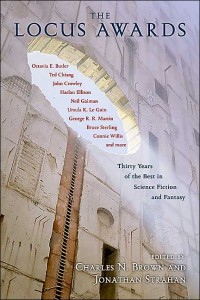 The Locus Award is given out each year by Locus magazine to the story picked by Locus readers out of a selection chosen by various editors and reviewers. Of those stories given the Locus Award over the past thirty years, eighteen have been chosen: four from the ‘70s,six from the ‘80s, five from the ‘90s, and three from the past few years. Now, the hard part is finding that small a number which can still represent the vast amount of material produced in that length of time, not to mention the radical evolution of the science fiction field over the years. Thus, and let’s be honest, even eighteen stories isn’t even going to catch sight of the tip of the iceberg. But Brown and Strahan give it a courageous attempt at trying to put together a satisfying list. The stories you’ll find here are the ones first selected by editors and reviewers, narrowed down by the readers themselves, and then finally sorted into this list, the pinnacle of the best in their opinion.
The Locus Award is given out each year by Locus magazine to the story picked by Locus readers out of a selection chosen by various editors and reviewers. Of those stories given the Locus Award over the past thirty years, eighteen have been chosen: four from the ‘70s,six from the ‘80s, five from the ‘90s, and three from the past few years. Now, the hard part is finding that small a number which can still represent the vast amount of material produced in that length of time, not to mention the radical evolution of the science fiction field over the years. Thus, and let’s be honest, even eighteen stories isn’t even going to catch sight of the tip of the iceberg. But Brown and Strahan give it a courageous attempt at trying to put together a satisfying list. The stories you’ll find here are the ones first selected by editors and reviewers, narrowed down by the readers themselves, and then finally sorted into this list, the pinnacle of the best in their opinion.
So what made the cut? Harlan Ellison’s classic “When Jeffty Was Five,” and Ursula K. LeGuin’s “The Day Before the Revolution” join Gene Wolfe’s “The Death of Doctor Island” and John Varley’s “The Persistence of Vision” to represent the ‘70s. In the ‘80s, we see authors such as George R.R. Martin (“The Way of Cross and Dragon”), Pat Murphy (“Rachel in Love”), and Octavia Butler (“Bloodchild”). The ‘90s bring us Terry Bisson’s acclaimed “Bears Discover Fire” and Connie Willis’ “Even the Queen” as well as Bruce Sterling’s “Maneki Neko.” To start the new millennium off properly, there’s Neil Gaiman with “October in the Chair,” Greg Egan’s “Border Guards” and Ted Chiang’s “Hell Is the Absence of God.”
Frankly, there aren’t a lot of surprises here. Given that by the book’s definition, it’s collecting award-winning stories, everything here has probably already been reprinted more than once, and any avid reader of science fiction will already be familiar with at least some of the material. Still, it’s a very nice selection of some top-notch material, and the biographical essays accompanying each story are a nice touch. So if you wanted a volume that contains a good selection of excellent work over a several decade period, either for yourself or as a sampler for a friend, The Locus Awards is a safe bet.
